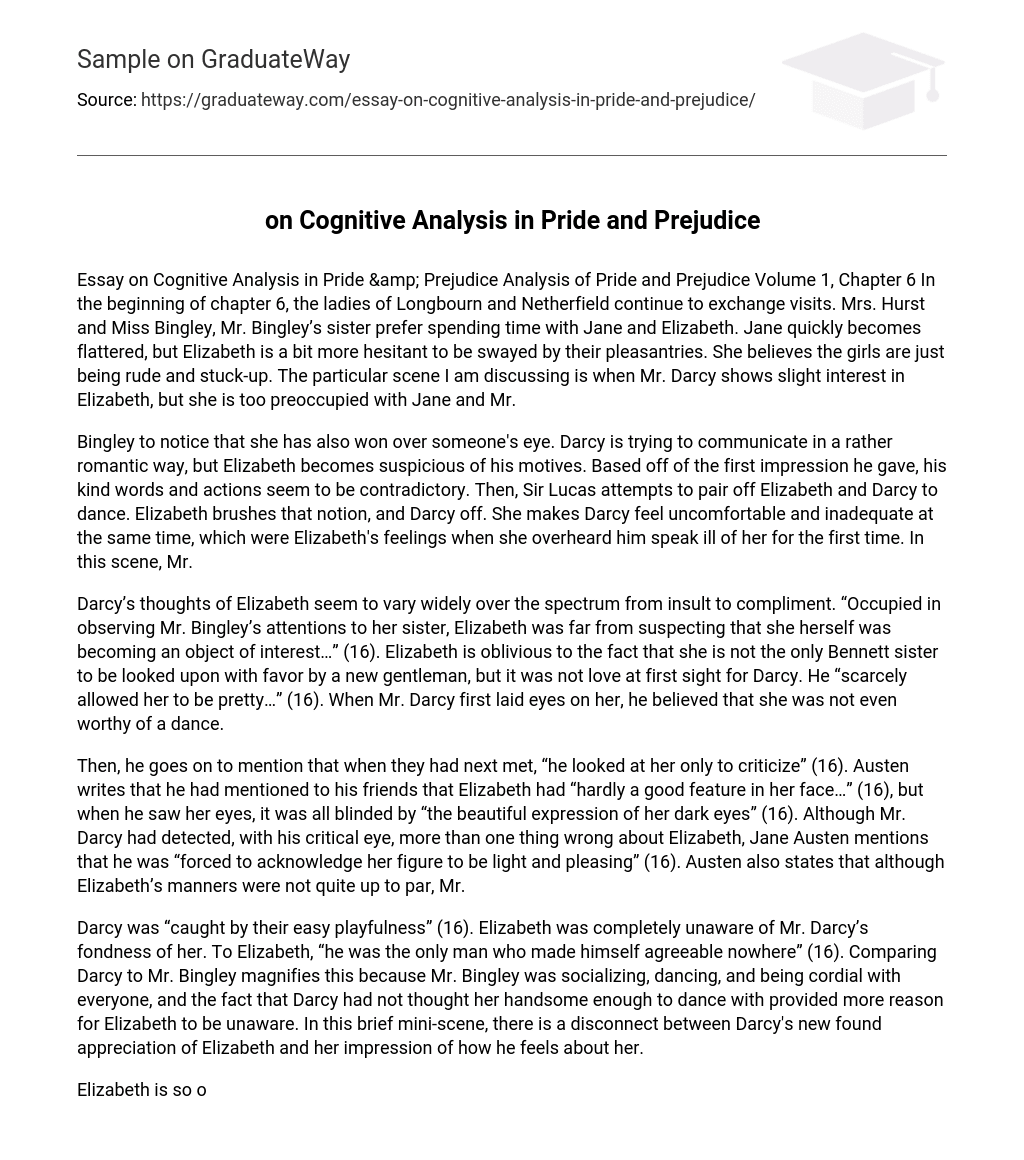Essay on Cognitive Analysis in Pride & Prejudice Analysis of Pride and Prejudice Volume 1, Chapter 6 In the beginning of chapter 6, the ladies of Longbourn and Netherfield continue to exchange visits. Mrs. Hurst and Miss Bingley, Mr. Bingley’s sister prefer spending time with Jane and Elizabeth. Jane quickly becomes flattered, but Elizabeth is a bit more hesitant to be swayed by their pleasantries. She believes the girls are just being rude and stuck-up. The particular scene I am discussing is when Mr. Darcy shows slight interest in Elizabeth, but she is too preoccupied with Jane and Mr.
Bingley to notice that she has also won over someone’s eye. Darcy is trying to communicate in a rather romantic way, but Elizabeth becomes suspicious of his motives. Based off of the first impression he gave, his kind words and actions seem to be contradictory. Then, Sir Lucas attempts to pair off Elizabeth and Darcy to dance. Elizabeth brushes that notion, and Darcy off. She makes Darcy feel uncomfortable and inadequate at the same time, which were Elizabeth’s feelings when she overheard him speak ill of her for the first time. In this scene, Mr.
Darcy’s thoughts of Elizabeth seem to vary widely over the spectrum from insult to compliment. “Occupied in observing Mr. Bingley’s attentions to her sister, Elizabeth was far from suspecting that she herself was becoming an object of interest…” (16). Elizabeth is oblivious to the fact that she is not the only Bennett sister to be looked upon with favor by a new gentleman, but it was not love at first sight for Darcy. He “scarcely allowed her to be pretty…” (16). When Mr. Darcy first laid eyes on her, he believed that she was not even worthy of a dance.
Then, he goes on to mention that when they had next met, “he looked at her only to criticize” (16). Austen writes that he had mentioned to his friends that Elizabeth had “hardly a good feature in her face…” (16), but when he saw her eyes, it was all blinded by “the beautiful expression of her dark eyes” (16). Although Mr. Darcy had detected, with his critical eye, more than one thing wrong about Elizabeth, Jane Austen mentions that he was “forced to acknowledge her figure to be light and pleasing” (16). Austen also states that although Elizabeth’s manners were not quite up to par, Mr.
Darcy was “caught by their easy playfulness” (16). Elizabeth was completely unaware of Mr. Darcy’s fondness of her. To Elizabeth, “he was the only man who made himself agreeable nowhere” (16). Comparing Darcy to Mr. Bingley magnifies this because Mr. Bingley was socializing, dancing, and being cordial with everyone, and the fact that Darcy had not thought her handsome enough to dance with provided more reason for Elizabeth to be unaware. In this brief mini-scene, there is a disconnect between Darcy’s new found appreciation of Elizabeth and her impression of how he feels about her.
Elizabeth is so occupied watching Jane and Mr. Bingley the she doesn’t notice that Mr. Darcy has begun to admire her. she says, “but if he does it any more I shall certainly let him know that I see what he is about” (17). Elizabeth believes that Mr. Darcy is paying too much attention to her and becomes wary. She also notices him eavesdropping on her conversations. Elizabeth immediately does not like it, and says that he has “a very satirical eye” (17) and that if “I do not begin by being impertinent myself, I will soon grow afraid of him” (17). Charlotte’s father, Sir Lucas advocates for Elizabeth and Darcy to dance.
Sir Lucas said, “my dear Eliza, why are not you dancing? – Mr. Darcy, you must allow me to present this lady as a desirable partner – you cannot refuse to dance” (18). “…she instantly pulled back” (18). Elizabeth responds by saying, “indeed, sir, I have not the least intention of dancing” (18). Mr. Darcy was denied, and is not too fond of it. While Mr. Darcy is contemplating Elizabeth, he is interrupted by Miss Bingley, who hopes he will join in on her criticisms of everyone. Miss Bingley interrupts Mr. Darcy’s thoughts by saying, “I can guess the subject of your reverie” (19).
Mr. Darcy replies, “I should imagine not” (19). Miss Bingley is desperately trying to get Mr. Darcy to poke fun at everyone. “The insipidity and yet the noise; the nothingness and yet the self-importance of all these people! – what I would give to hear your strictures on them” (19). Mr. Darcy assures Miss Bingley that her thoughts and her demeanor are totally wrong for the situation, but then fixes his eyes directly on Elizabeth. The scene ends with Miss Bingley feeling very jealous about Mr. Darcy’s attention to Elizabeth, and begins to flirt with him.
She teases him saying what a great mother-in-law Mrs. Bennett would make, and it is evident that Darcy isn’t opposed or put-off by her mockery. In relation to Pride and Prejudice as a whole, the scene is important because it shows that Austen can masterfully intertwine different mindsets by multiple characters at one time. Her dialogue is not in your face and blunt, so if a word here or there is glossed over, the entire flow of the characters is different. This scene sets up what is going to be a very interesting metaphorical dance of the minds between Darcy and Elizabeth.





